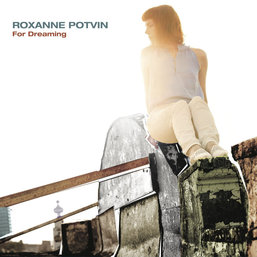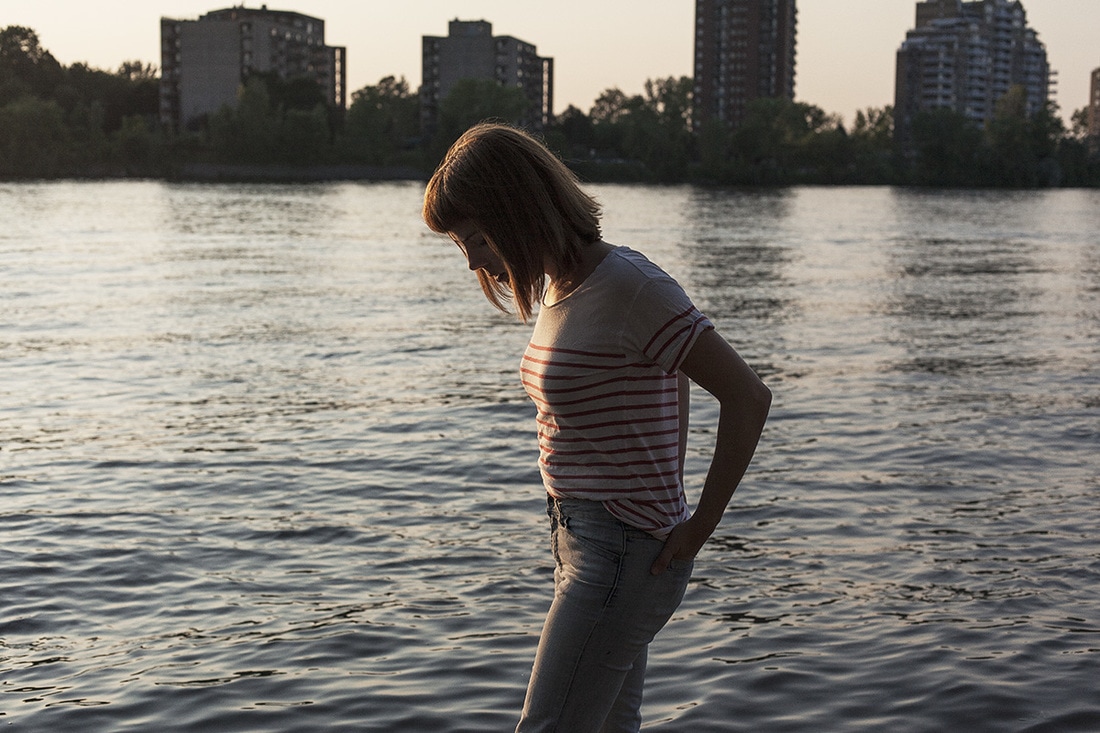|
Montreal-based singer/songwriter Roxanne Potvin says that one of the most valuable lessons she has learned about creativity (and life) is: what scares you is usually what means the most to you. And if what means the most is the music, Roxanne has faced that fear head on, resulting in an admirable and enduring body of work. Her latest album, For Dreaming, recorded after a five year break from music, is the well crafted result of all the years Potvin has spent cultivating and composing simplicity; only keeping what is necessary, the bare bones of emotion. As Bob Mersereau once wrote of Potvin, "The beauty, well, that’s the sound of somebody who has learned how to make the sounds in her heart come alive.” "I think the most significant thing being a songwriter has taught me" Roxanne says, "is how much of yourself is shown to you in the process." Here we get a small glimpse of what those things are. AHC: What has this journey in music, so far, been like for you, the highs and the lows, and what life lessons do you feel you've picked up along the way? Roxanne: That answer could easily fill a couple of pages but I'll try to be concise! I think the most significant thing being a songwriter has taught me is how much of yourself is shown to you in the process. And the more you know about yourself the more you're able to relate to human beings in general and you have so much more to write with and about from that. As you become more self-aware you learn how to listen to and understand more deeply, others and yourself. To try to create something that's your unique contribution and reach people with it, you're faced with so many of your own insecurities, self-doubts and hang-ups, you have to learn to work with all that stuff to get better, I think. Also the more you expose yourself fully, the more people are able to relate to you. But also it can't just be an excuse for your own catharsis, the listener has to feel included, that's where craft and aesthetics come in. You get used to rejection too, you can't avoid it, to the point where it doesn't discourage you from the bigger goal. You learn how to be open to criticism and see the lessons in it etc etc. I could go on! It's a commitment you make to keep going because the ups and downs never stop, but the useful lessons are constant. Living life feeds you as a writer and vice-versa. It takes a lot of soul-searching. And shear stubbornness, frankly, but the rewards are literally life-changing! AHC: What first drew you to music and what was your early musical environment like growing up? Were there pivotal songs for you then that just floored you the moment you heard them? Roxanne: Music was always a friend and a companion to me and to my whole family I think. Both sides of the family enjoy music and/or play on some level. So much that I never really seriously considered it as a career until my late teens, because it had always sort of been there. I remember being little and wanting to have a nice voice so I would sing along to records and work on my voice, but it was instinctual, there wasn't an agenda attached to it or a career goal. It was just because I loved music and wanted to be able to do it. Same with writing. I was writing poems and stories for as long as I can remember. Getting into the Beatles was a big turning point for me at 13 and got a guitar. That was the start of it all coming together, wanting to write songs and sing and play them. It brought together all the puzzle pieces. And then I got into the blues at 15 and that's when I thought this could actually work, because I started going to open jams and getting attention and positive feedback. AHC: Do you remember the first song that you ever wrote or played? Or that first moment when you picked up a pen and realized that you could create whole worlds just by putting it to paper? Roxanne: I remember picking up my dad's guitar when I was 7 or 8 and teaching myself the bass line to Queen's Under Pressure which I only knew at the time as the Vanilla Ice song Ice Ice Baby so that would be the first song I ever played on guitar! haha :) Took piano lessons around that time too, learning classical stuff. I started attempting to write songs when I was 13-14 and in love with the Beatles, learning to play guitar, but couldn't figure out how to finish the song so I'd only have parts, it took til I was about 18-19 to write a whole finished song and really, my first songs were carbon-copies of blues songs I loved at the time. Over time I started crafting songs I felt were more my own, it took many more years though. I only started being somewhat satisfied with my writing and finding my own way when I was about 28... AHC: Which musicians have you learned the most from? Or writers, artists, filmmakers etc? Roxanne: The Beatles are still my go-to reference for songwriting and even sounds and arrangements. I love everything about those albums... John Lennon and Beck for lyrics and Beck for sounds too, always loved his mixing of old with new. More recent influences include Kurt Vile, Bahamas, Tobias Jesso Jr., Andy Shauf…. Lot's of amazing songwriters coming out of Canada these days in the case of the last 3! I was always influenced by the roots of pop music, the blues was a huge influence early on, it's the backbone for everything else as far as I'm concerned. You can learn so much about songwriting and storytelling and the effectiveness of simplicity listening to those early blues records. Simplicity meaning only keeping what is necessary to get the emotion across. I'm a big fan of simplicity! AHC: What do you think makes for a good song, as you're writing and composing, is there a sudden moment when you know you've found the right mix, that perfect angle of light, so to speak? Roxanne: There are two steps usually. The first is when the tension releases as I'm writing something that I feel is "right", that I don't feel the need to tinker with it anymore. Second, if I can play it for someone without cringing or being self-consicous at any point, I know I can probably live with it in it's current form. That's my definition of a good song from my own perspective. There's a ton of objective and subjective criteria for a good songs beyond that... AHC: Do you consider music to be a type of healing art, the perfect vehicle through which to translate a feeling, a state of rupture/rapture, hope lost and regained? Does the writing and creating of the song save you in the kinds of ways that it saves us, the listener? Roxanne: Absolutely. And that's probably the driving power behind my desire to make music, it's that I hope I can make people feel with my music the way I feel listening to music that I love. AHC: What are your fondest musical memories? In your house? In your neighborhood or town? On-tour, on-the-road? Roxanne: There are too many to name just a few here. Music, listening to and playing it, has been the thing that has brought me the most joy in day to day life, emotional support in hard times, it makes me excited to get out of bed in the morning, it's been my companion now for most of my life. It's vital to me. AHC: When you set out to write a song, how much does 'where the world is' in its current moment, culturally, politically, otherwise, influence the kinds of stories you set out to tell? Roxanne: I wish I was better at writing socially-engaged songs because I believe that they can bring people together and inspire social movements through awareness and empathy. Right now though, it usually feels really trite and cliche when I try… I haven't figured it out yet but it's something that I want to do more of. AHC: Do you have any words of advice for other musicians and singer-songwriters out there who are just starting out and trying to find their voice and their way in this world? What are the kinds of things that you tell yourself when you begin to have doubts or are struggling with the creative process? Roxanne: My advice first and foremost would be: trust your gut. Trust yourself and what you want and what you're aiming for and you might not know exactly what that is right at the beginning but you'll always have clues so pay attention to them. In my experience it takes time... That's the only thing that will consistently lead you to where you need to be in order to learn and grow and become the artist you aspire to become, even when you make mistakes. That doesn't mean don't take advice or learn from others who might be more experienced than you, it is really important to surround yourself with mentors and people who inspire you, but even still, if something doesn't feel right or rubs you the wrong way, trust that and know that that feeling is there for a reason. Self-doubts will always come and go, you just learn to ride that wave. One of the most valuable lessons I've learned about creativity (and life) is: what scares you is usually what means the most to you, so absolutely keep going when you're scared! AHC: Do you have any new projects you'd like to mention? Roxanne: I have a few ideas for different projects floating around in my brain, nothing I can really talk about yet because they're just ideas for now, but when I get home from the short tour I'm on right now, I plan on getting some writing done to record something new in early fall. For more visit roxannepotvin.com/ 
To stream and purchase Roxanne's latest release, For Dreaming, visit roxannepotvin.bandcamp.com/
Comments are closed.
|
AuthorWrite something about yourself. No need to be fancy, just an overview. Archives
April 2024
Categories |

 RSS Feed
RSS Feed
